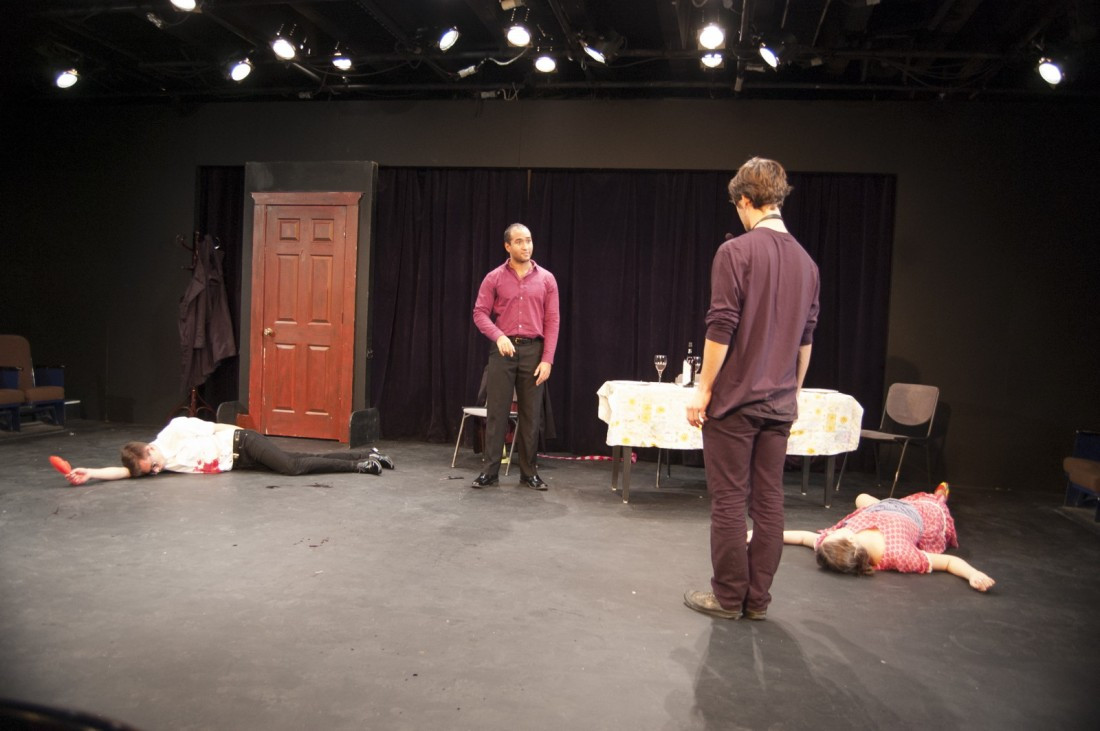Tactile theatre
Experimental theatre pushes ordinary performance to its limits
Who’s acting and who’s dying? That’s what Kai Chochinov’s play Deadly Politics had audience members asking themselves as they sat in darkness, observing as an audience member, or maybe as an actor?
Nothing was for certain in this “murder mystery murder mystery,” a new genre Chochinov explores that breaks the fourth wall, and possibly the dimension. Who knows what really happened at the University of Manitoba’s Black Hole Theatre?
The premise was to have a play within a play. It began with a purposely over the top, extremely bad play, then fell into chaos when one of the bad actors drops dead.
“At that point, all hell breaks lose,” Chochinov says. “A real murder mystery begins where everyone in the theatre, including the audience, is a suspect.”
This is the first play Chochinov has written, and he is especially excited to have manipulated the form of the play, venturing away from the more traditional genres of theatre.
“My purpose for the show is for the audience to experience something weird, wacky, stupid, dark and, hopefully, very funny,” Chochinov says. “I don’t really care if anyone gets anything important out of it as long as it makes them laugh.”
While blending boundaries between audiences and actors is not new, it’s something that belongs to the experience of viewing a play as, unlike other mediums of entertainment, theatre is live.
“In film and television, you can only pretend to speak to the audience,” Chochinov says. “Theatre doesn’t have to pretend it’s addressing the audience, it can speak directly to them in person.”
Chochinov is hoping to further explore the full reach of this medium when writing his next play.
“I would love to continue pushing the boundaries of theatrical form in future plays,” Chochinov says. “More specifically, I would like to further explore ways of telling stories that can only be told on stage.”
Daphne Finlayson, the director of Deadly Politics, agrees that experimenting with form is crucial for theatre to progress.
“Experimental theatre encourages the art form to grow, especially as we have to compete with more movies and other entertainment options,” Finlayson says. “By pushing the limits of what’s possible on stage, theatre is forced to change instead of becoming stagnant and stuck in what’s already been done.”
Both University of Manitoba theatre students, Finlayson and Chochinov worked together on this play, and hope their future endeavors will continue to push boundaries.
“I would definitely like to continue working with non-traditional theatre,” Finlayson says. “It forces you to grow, learning to adapt to what’s being thrown at you, taking a script and bringing it to life on stage.”
Deadly Politics was an opportunity to try something new with audiences while just skimming the surface of what experimental theatre can really entail.
“Even trying something and failing is better than not trying anything new at all,” Finlayson says. “Winnipeg isn’t a big theatre city like London or New York, but we can help stand out by trying new things and keeping things interesting.”
Published in Volume 70, Number 7 of The Uniter (October 22, 2015)







